On October 31, 1988, the judge in the hearing to determine which of Frankie Lymon’s three marriages was legally binding reached a decision. It came nearly seven months after final briefs were filed in the case and a little over eight months after Ronnie Italiano and the UGHA had dedicated their Frankie Lymon memorial tombstone.
Surrogate Court Judge Marie Lambert found Elizabeth Waters to be Lymon’s legal widow. According to the Washington Post story by Paula Span, the judge’s opinion entitled Waters to an estate estimated to be worth close to a million dollars in accumulated royalties from Lymon's 1956 hit, “Why Do Fools Fall In Love”, and its more recent incarnations.  (L to R) Elizabeth Waters, Zola Taylor, Emira Eagle
(L to R) Elizabeth Waters, Zola Taylor, Emira Eagle
The decision doomed the hopes, at least for the time being, of both Zola Taylor and Emira Eagle, each of whom had claimed in court to be Lymon’s widow and heir. Span wrote that it also stalled, or possibly killed, the federal lawsuit that Eagle had brought against Morris Levy to reclaim the publishing rights to his hit song.
Waters, who had been working in a furniture store in Philadelphia, got the news over the phone from her attorney in South Carolina where she was attending a family funeral. Waters bore Lymon's only known child, a daughter, who died shortly after birth. “She was speechless, actually unable to talk,” attorney Dwight Peterson stated. "When she recovered, she declared that she knew it; she'd had faith all along. She was so taken with the idea of being once and for all declared the real Mrs. Frankie Lymon," Peterson said.
Span reported that the court found that "the decedent and Elizabeth {Waters} have satisfied the requirements of common law marriage in the State of Pennsylvania." Though Waters was not yet divorced from her first husband when she and Frankie Lymon married in a civil ceremony in Alexandria in 1964, their union became valid when that divorce became final in 1965.
The opinion dismissed the claims of Taylor, who was unable to produce "credible proof" of her marriage to Lymon or her divorce from her previous husband, both of which she said occurred in Mexico. Taylor's attorneys could not be reached for comment.
Lymon's 1967 marriage to Eagle, marked by a ceremony at the Beulah Grove Baptist Church, was invalid, according to the opinion, because he was still married to Waters. William McCracken, who represented Emira Eagle, called her at the elementary school where she taught. "I didn't want her to hear it on the news," he said. "My client has a strong religious background and beliefs, so I don't think she'll be devastated, but I know she's disappointed to say the least. Knowing the facts like I know them, I feel confident there will be an appeal." Emira's New York counsel, Ira Greenberg, agreed and her legal team soon began plotting their strategy.
Aside from Waters, the winner of the case was Morris Levy, head of Roulette Records, and the defendant when Eagle brought a federal suit in 1984. Span quoted Levy’s attorney, Leon Bornstein, as saying, “If the ruling stands, then we will go to federal court and instruct the judge that the party who commenced the action is the wrong party." 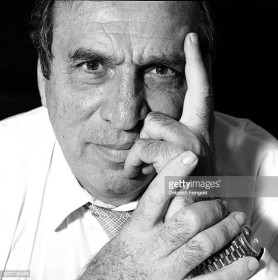 Morris Levy
Morris Levy
Levy didn’t get to celebrate his court victory very long. In December, the record executive was convicted by a Federal jury in New Jersey of conspiring to extort, and he was sentenced to ten years in prison and a $200,000 fine. Levy’s conviction was the result of an F.B.I. investigation of racketeering in the record industry. But he would have little trouble with Elizabeth Waters over the rights to "Why Do Fools Fall In Love", Span reported. "She never disputed Levy's role in the creation and authorship of the song," her attorney said.
Following the court case, Ronnie Italiano contacted Emira’s lawyers about placing the UGHA’s tombstone on Frankie’s grave. Even though she had lost the case, Emira had paid for his burial at St. Raymond’s Cemetery and she was the only person who had the authorization to allow it. Her team had already began to put together the plan for her appeal, however, and they believed that it would not be in Emira’s best interest, from a legal standpoint, to have the UGHA put up a stone.
“Ronnie had no authorization in writing. So when he contacted the attorneys and they asked for written documents, he had nothing,” Bill Olb recalled. “That ended any possibility of it being placed on Frankie’s grave, and they made it clear that there was no interest in ever putting it on the grave.”
Instead, Emira placed her own headstone on Frankie’s grave in 1988 to help bolster her appeal. It was inscribed with the words, In Loving Memory Of My Husband Frank J. Lymon. For all their efforts, Ronnie and the UGHA were now left with a very large granite tombstone, engraved in the memory of Frankie Lymon, with no place to put it. 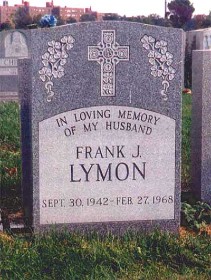 Emira's tombstone
Emira's tombstone
“It was Chuck Rubin’s idea to have her put a headstone on the grave,” Joel Warshaw revealed. “It was all about money for Emira. I don’t know if she was a good wife; Frankie wasn’t around that much, but she was probably a decent person. Nobody really gave a shit about a stone when he died. It later became a big legal situation,” he said. “The people who really cared were the UGHA people. They believed that Frankie Lymon was a big part of the doo wop movement, and they wanted to do something for him. It was done in sincerity versus legality. The motives of Ronnie and the UGHA were pure.”
Emira’s headstone did not appear to be a factor in early 1989 when she was victorious in her appeal of the Surrogate Court decision. Elizabeth Waters then filed a motion to appeal that decision. It went all the way to the New York Court of Appeals which turned down the motion by Elizabeth to appeal the lower court decision that named Emira the widow of Frankie Lymon. Zola Taylor, who had failed to provide any documentation of her marriage to Lymon, had dropped out of the case before it reached the Court of Appeals.
More than two decades after Frankie Lymon sang his final note, the debate over which of three women was his widow was over at last. The decision guaranteed Emira at least partial claim to "Why Do Fools Fall in Love," which had earned more than $1 million and was still bringing in money, according to Chuck Rubin, president of the Artists Right Enforcement Corp. Emira’s quest for part of the song's earnings wasn't over. Her federal lawsuit against Levy could proceed now that it had been established that she was the rightful widow.
Morris Levy was not as fortunate. He appealed his 1988 conviction, but it was upheld in October 1989. In January 1990, Levy unsuccessfully petitioned to have his sentence eliminated because of his failing health. He was granted a 90-day stay, but he passed away from cancer in May of 1990 – two months before he was scheduled to report to prison.
While the appeals were being heard in court, the North Arlington monument company wanted the Frankie Lymon tombstone moved out. Ronnie came up with the novel idea of displaying the stone at his record store in Clifton as "The Official Headstone of Frankie Lymon." The first order of business was deciding where it could safely be placed. The store had a basement, and the floor above it was not strong enough to securely hold a tombstone weighing well over 1,000 pounds without causing structural damage. The only possibility was the front window area of the store that was beyond the basement and constructed on solid ground.
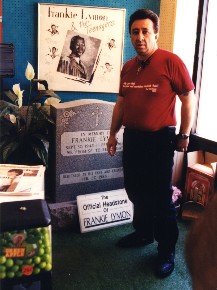 Ronnie with Frankie's tombstone at Clifton Music
Ronnie with Frankie's tombstone at Clifton Music
The other major issue was figuring out how to get an object that large and heavy into the store after it had been delivered from North Arlington. According to Bill Olb, Ronnie’s friendship with Clifton’s mayor helped get the job done.
Ronnie’s store, his radio program, and the shows he promoted in Clifton had brought both attention and economic benefits to the city. But his music store was located just three blocks from the bus stop that took people from Clifton to New York City each day, and it was no small matter to block a main thoroughfare, especially an important bus route to New York. With the mayor’s approval, however, the street was blocked off, a crane was brought to Clifton Music, the front window of the shop removed, and the stone was safely installed. Frankie Lymon’s tombstone had finally found a home.
The next court case involving the rights to “Why Do Fools Fall In Love” was the federal lawsuit against Morris Levy and his companies along with Emira Lymon. It was filed in District Court by original Teenagers, Jimmy Merchant and Herman Santiago. In their complaint, the Plaintiffs stated that the copyright registration, as filed and amended, inaccurately attributed authorship credit for “Why Do Fools Fall In Love”. They claimed that they were the co-authors of the song with Frankie Lymon when they were all Harlem street-corner harmonizers hoping for a break.
As co-authors, each Plaintiff asserted a claim to an ownership share of the “Fools” copyright and a proportionate share of the royalties. Before trial, the judge dismissed all claims against Emira Lymon, but allowed the action to proceed against the Levy Defendants.
By agreement of both parties, the trial was held in part before a jury and in part before Chief Magistrate Judge Buchwald. The jury's findings focused on the issues of authorship, fraudulent concealment, and duress. The parties agreed that, based on the jury's findings, the Court would make final rulings on whether the Plaintiffs were entitled to an ownership interest in the “Why Do Fools Fall In Love” copyright, and would decide issues relating to the statute of limitations and other factors related to the case. The Court was also to decide, as fact-finder, whether Merchant and Santiago were entitled to judgment on their copyright infringement claim.
Merchant and Santiago testified that in 1955 they jointly wrote the initial version of the song, and that Frankie Lymon made a number of changes to the song when he subsequently joined the group. In 1956, the Teenagers recorded “Why Do Fools Fall In Love” for Gee Records, then owned and operated by George Goldner, now deceased. 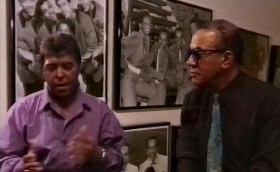 Herman Santiago and Jimmy Merchant
Herman Santiago and Jimmy Merchant
The Plaintiffs testified that they relied upon Goldner to handle the formalities of copyrighting the song, and that Goldner informed them that only two of the three authors could be listed on the copyright. Subsequently, Goldner filed the “Fools” copyright with the Copyright Office in 1956, listing himself and Lymon as sole co-authors.
The Levy Defendants maintained that Goldner was properly listed as an author because he was personally involved in writing and arranging “Why Do Fools Fall In Love.” They also contended that Goldner was a co-author of “Fools” under the “work for hire” doctrine because, during the “Fools” recording session, a saxophone solo composed by a studio musician was incorporated into the song.
In court it was revealed that Frankie Lymon, after he had left the Teenagers in the late 1950’s, agreed to let Goldner exploit Lymon’s interest in “Why Do Fools Fall In Love.” Goldner, after amassing too many gambling debts in 1964, sold his control of the copyright to Morris Levy.
In 1965, Lymon was a heavy drug user. He needed money and sold his "Why Do Fools Fall In Love" rights to Levy. Morris Levy was later quoted in the New Yorker as saying that he paid Frankie Lymon $1,500.
In a letter to the Copyright Office dated June 24, 1965, Goldner stated that Levy, rather than Goldner, had co-authored “Fools” with Lymon. The copyright registration was amended to reflect this statement and, thereafter, the copyright was held by Levy's company, Big Seven Music. Thus, when "Why Do Fools Fall in Love" appeared in the 1973 movie, American Graffiti, and when Diana Ross covered the song for a hit in 1981, Levy received 100 per cent of the royalties.
Both Merchant and Santiago reached the age of majority (21) in 1961. They testified that on several occasions in the 1960s they contacted Goldner, and then Levy, to inquire about royalty payments, but to no avail.
Merchant and Santiago testified that they never received any royalties from their claimed co-authorship of “Why Do Fools Fall In Love”. They said they were afraid of Levy and that fear made them reluctant to press their claims. Santiago testified that Levy threatened him in 1969, and Merchant testified that Levy threatened to kill him when, in 1977, he inquired about royalties. They also asserted in court that they feared Levy because he was closely affiliated with organized crime and connected to a number of violent incidents.
Beginning in the late 1970s, Merchant and Santiago took various steps in pursuit of their claim, including hiring an attorney and investigator to look into the status of the copyright. They did not take formal legal action, however, until 1987.
On November 17, 1992, thirty-six years after “Why Do Fools Fall In Love” topped Billboard’s R&B chart, the jury found in favor of Jimmy Merchant and Herman Santiago. The decision appeared to be a complete victory for the Plaintiffs. The jury found that that Goldner was not an author of “Why Do Fools Fall In Love,” and that that Goldner and Levy deliberately concealed from the Plaintiffs the accrual of royalties. In addition, the jury found that Levy threatened the Plaintiffs with physical force and that the Plaintiffs reasonably refrained from commencing suit because of the threats during a period that began in 1969 and lasted until December 24, 1984.
U.S. District Magistrate Judge Naomi Reice Buchwald announced that a second hearing would be held to determine how much was owed, and Carl Person, attorney for both Merchant and Santiago, estimated that the men were owed $4 million. The pair, who both lived in New York, had been performing occasionally as the Teenagers, but Santiago was unemployed and Merchant worked as a cab driver. "We’re very excited," Merchant told the Associated Press. "The blessing comes after a long period of suffering."
Carl Person said the case was unique because it stretched back four decades. Usually, he said, a copyright case can only be brought for injuries during the past three years. That fact would ultimately turn out to be the fly in the ointment for Merchant and Santiago.
Ira Greenburg, who had represented Emira Lymon but was now the attorney for the Levy Defendants, said he would appeal. Greenberg said the verdict provided ″powerful incentive for other oldies' artists to come out of the woodwork″ and suddenly claim ownership of songs. ″Thirty-some years have gone by since the song came out, and a lot of the witnesses are either dead or retired or missing,” he said. 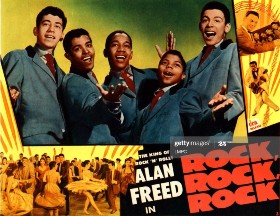 Frankie Lymon and the Teenagers 1956
Frankie Lymon and the Teenagers 1956
Merchant and Santiago received more good news in 1993 when Frankie Lymon and the Teenagers were inducted into the Rock and Roll Hall of Fame along with Ruth Brown, Cream, Creedence Clearwater Revival, the Doors, Etta James, Van Morrison and Sly and the Family Stone. The group was inducted by Motown’s Boyz II Men, who in their speech credited the Teenagers as trailblazers for future vocal groups, and they also mentioned the landmark decision of a few months earlier that awarded songwriting credit to Merchant and Santiago.
The event was held in Los Angeles. Both Merchant and Santiago were in attendance, while Frankie was represented by Emira Lymon, and Sherman Garnes and Joe Negroni were represented by their daughters. Each spoke briefly, and then Boyz II Men performed “Why Do Fools Fall In Love” in the Teenagers' honor.
More good news came later in 1993 when a court found Levy’s estate liable for $4 million in the case in which Merchant and Santiago sued for unpaid royalties. In 1988, Levy had sold Roulette Records and his publishing rights for a sum estimated to be roughly 10 times that amount.
The rug was pulled out from under Merchant and Santiago, however, when their victory was reversed by the Court of Appeals in 1996. The Levy Defendants had challenged the District Court's subject matter jurisdiction in the appeal and contended that the Plaintiffs failed to establish that they were joint authors of “Why Do Fools Fall In Love”. The Defendants additionally argued that the District Court erred in not dismissing the action for a declaration of copyright co-ownership as barred by the statute of limitations.
Civil actions under the Copyright Act are subject to a three-year statute of limitations.The Court of Appeals stated that its reversal of the lower court’s decision promoted the principles of repose that were integral to a properly functioning copyright market. Those principles of repose included a statute of limitations that cuts off certain legal rights if they are not acted on by a specific deadline.
The Appeals Court held that the Plaintiff’s claim to seek a declaration of copyright co-ownership rights to “Why Do Fools Fall In Love” and any remedies that would flow from such a declaration were time-barred three years after their discovery of the copyright infringement. In other words, Merchant and Santiago did not bring the case to court soon enough, and the reversal by the Court of Appeals gave the song rights back to Lymon and Levy.
It was a bitter pill to swallow for Jimmy Merchant and Herman Santiago. As youngsters they had been cheated and taken advantage of by unscrupulous people in the music business. Now, after both had reached the age of 52 and believed that justice had finally been served, they had lost out again to the late Morris Levy, a convicted felon who had threatened their lives. What made it even more painful was the fact that it was the result of a provision in a law that was originally written to protect and give relief to the co-authors of songs. 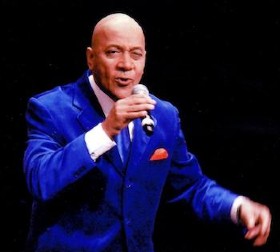 Jimmy Merchant in recent photo
Jimmy Merchant in recent photo
In the aftermath of the reversal, Joel Warshaw helped Merchant and Santiago, along with the families of Garnes and Negroni, get performance royalties for the Teenagers’ songs through Chuck Rubin; but they missed out on the big money when the copyright for “Why Do Fools Fall In Love” was lost on appeal.
Despite the setback, the Teenagers continued to perform with numerous lineups. In the 90’s, Jimmy Castor was brought in to do the lead vocals in the group, and Bobby Jay and Frankie’s brother, Lewis Lymon, also signed on. Castor was later replaced by Timothy Wilson.
Jimmy Merchant left the Teenagers in 1997. He performed with the Doo Wop All Stars for two years before returning to the group. Merchant retired from the Teenagers in 2005 and is writing a book about the group's history. Herman Santiago has been the one constant member of the Teenagers over the years, and the current version of the group is managed by Herman’s wife, Rita Santiago.

